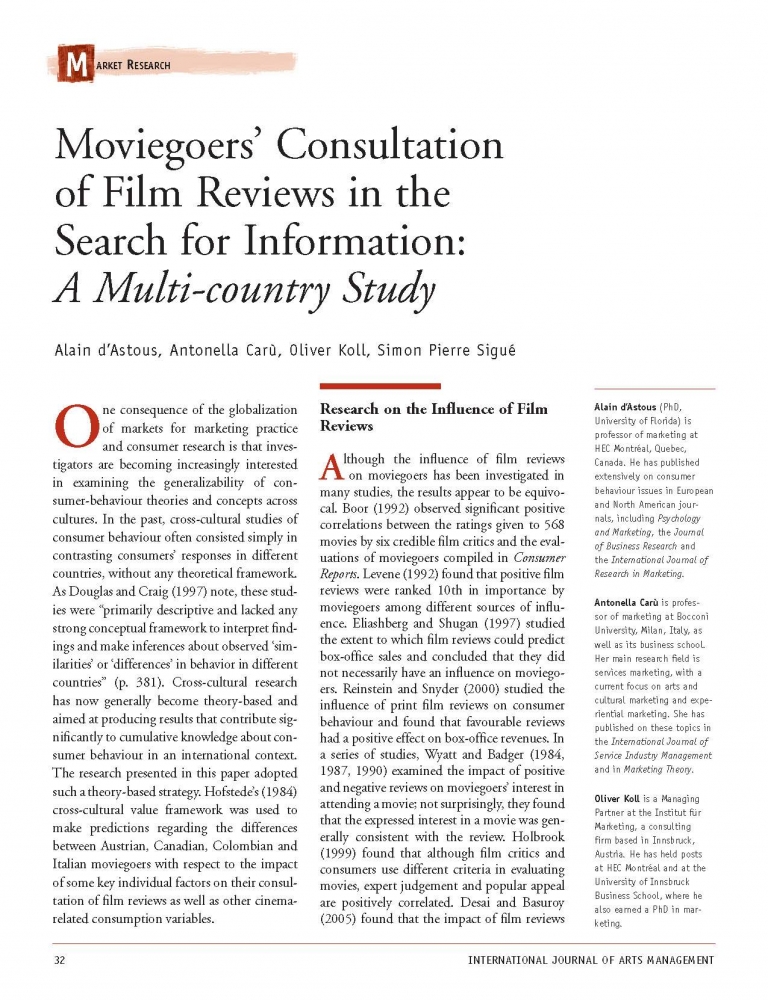Moviegoers’ Consultation of Film Reviews in the Search for Information: A Multi-country Study
Produit: Article
21,00 $ CA
Alain d’Astous, Antonella Carù, Oliver Koll, Simon Pierre Sigué
Alain d’Astous (PhD, University of Florida) is professor of marketing at HEC Montréal, Quebec, Canada. He has published extensively on consumer behaviour issues in European and North American journals, including Psychology and Marketing, the Journal of Business Research and the International Journal of Research in Marketing.
Antonella Carù is professor of marketing at Bocconi University, Milan, Italy, as well as its business school. Her main research field is services marketing, with a current focus on arts and cultural marketing and experiential marketing. She has published on these topics in the International Journal of Service Industry Management and in Marketing Theory.
Oliver Koll is a Managing Partner at the Institut für Marketing, a consulting firm based in Innsbruck, Austria. He has held posts at HEC Montréal and at the University of Innsbruck Business School, where he also earned a PhD in marketing.
Simon Pierre Sigué (PhD, HEC Montréal) is Associate Professor of Marketing at Athabasca University, Canada, and honorary Associate Professor in the School of Business, Universidad de Los Andes, Colombia. He conducts research in the areas of franchising, marketing channel coordination, relationship marketing and international marketing. He is the author of a number of books and scientific papers, some of which have earned international awards.
ABSTRACT
A cross-cultural study was conducted with Austrian, Canadian, Colombian and Italian moviegoers. Based on Hofstede’s well-known value framework as well as some findings in the consumer information search literature, seven research hypotheses were put forward and tested. These hypotheses were based in part on presumed differences between the four countries on three cultural values: power distance, uncertainty avoidance and individualism. As predicted by Hofstede’s framework, Canadian moviegoers appreciated significantly more movie genres than Austrian, Colombian and Italian moviegoers. Along with Austrians, they were more susceptible to value-expressive social influence as regards cinema than Colombian and Italian moviegoers. In addition, the impact of susceptibility to value-expressive social influence was stronger in the Austrian and Canadian samples than in the other samples. Although not all research hypotheses were entirely supported by the results, this study shows the value of using a theoretical framework to predict consumer behaviour differences attributable to varying cultural orientations.
KEYWORDS
Cinema, moviegoers, film reviews, cultural values
RÉSUMÉ
Une étude interculturelle a été réalisée auprès de cinéphiles d’Autriche, du Canada, de Colombie et d’Italie. Basées sur le cadre de valeurs bien connu de Hofstede et sur la littérature concernant la recherche d’information effectuée par le consommateur, sept hypothèses de recherche ont été avancées et testées. Celles-ci s’appuyaient partiellement sur les différences présumées entre les quatre pays relatives à trois valeurs culturelles : distance hiérarchique, évitement de l’incertitude et individualisme. Comme le cadre de Hofstede le laissait prévoir, les cinéphiles canadiens se sont intéressés à un choix beaucoup plus vaste de genres de films que leurs homologues autrichiens, colombiens et italiens. En matière de cinéma ils ont été, comme les Autrichiens, plus susceptibles à l’influence sociale fondée sur l’expression des valeurs que les Colombiens et les Italiens. De plus, l’impact de cette susceptibilité s’est révélé plus important dans les échantillons autrichiens et canadiens. Même si les résultats n’ont pas vérifié toutes les hypothèses, l’étude montre l’utilité de recourir à un cadre théorique pour prédire les différences de comportement des consommateurs attribuables à diverses orientations culturelles.
MOTS CLÉS
Cinéma, cinéphiles, critiques de films, valeurs culturelles
RESUMEN
Se llevó a cabo un estudio multicultural entre el público de cine en Austria, Canadá, Colombia e Italia. Partiendo del conocido marco de referencia de valores elaborado por Hofstede, así como otras conclusiones derivadas de la literatura sobre la información para el consumidor, se formularon siete hipótesis de investigación. Estas hipótesis se basaron, en parte, en las diferencias que se presume existen entre los cuatro países respecto de tres valores culturales: distancias de clase, rechazo de la incertidumbre, e individualismo. En coincidencia con la predicción arrojada por el marco de referencia de Hofstede, se vio que el público canadiense aprecia una variedad muchísimo mayor de géneros cinematográficos que los públicos austríaco, colombiano e italiano. Al igual que los austríacos, se muestran más susceptibles que los italianos y los colombianos a la influencia social que vehicula valores en el cine. Asimismo, el efecto de esta susceptibilidad es más fuerte en el grupo de estudio de canadienses y austríacos que en los otros dos grupos. Si bien no todas las hipótesis de investigación encontraron una total validación en los resultados obtenidos, el estudio destaca el valor de utilizar un marco de referencia teórico en la predicción de las diferencias de comportamiento del consumidor atribuibles a las diversas orientaciones culturales.
PALABRAS CLAVE
Cine, público de cine, críticas de cine, valores culturales
